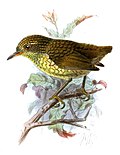| Amblyornis | |
|---|---|
 | |
| Streaked bowerbird, Amblyornis subalaris | |
| Scientific classification | |
| Kingdom: | Animalia |
| Phylum: | Chordata |
| Class: | Aves |
| Order: | Passeriformes |
| Family: | Ptilonorhynchidae |
| Genus: | Amblyornis Elliot, 1872 |
| Type species | |
| Ptilorhynchus inornatus Schlegel, 1871 | |
Amblyornis is a genus of passerine birds belonging to the bowerbird family Ptilonorhynchidae. The species are endemic to the mountains of New Guinea.
Contents
Birds in this genus build "maypole-type" bowers in which vegetation is arranged around a central vertical sapling or tree-fern. [1] [2]
